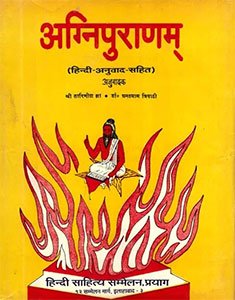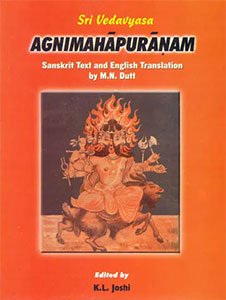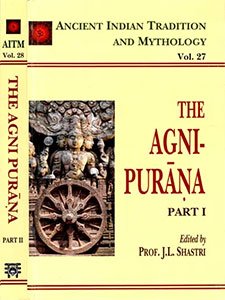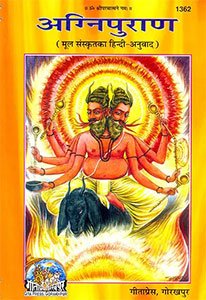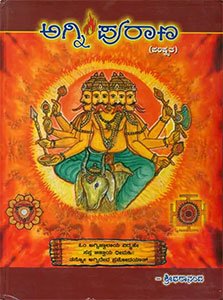Agni Purana [sanskrit]
97,288 words
This Sanskrit edition of the Agnipurana. It is one of the traditional eighteen Mahapuranas presented as an encyclopedia of ancient Indian history and knowledge. It contains either 382 or 383 chapters and over 10.000 verses (Sanskrit Shlokas).
Verse 133.34
मृत्युञ्जयं प्रवक्ष्यामि नामसंस्कारमध्यग ।
कलाभिवेष्टितं पश्चात्सकारेण निबोधितं ॥ ३४ ॥
mṛtyuñjayaṃ pravakṣyāmi nāmasaṃskāramadhyaga |
kalābhiveṣṭitaṃ paścātsakāreṇa nibodhitaṃ || 34 ||
The Sanskrit text of Verse 133.34 is contained in the book The Agni Puranam (Anandashram Edition) by Shri Chimna Apate (श्री चिमणा आपटे). This book is available online or you could buy the latest edition:
Read online Buy now! The Sanskrit text by Shri Chimna Apate (श्री चिमणा आपटे) (1987)
Glossary of Sanskrit terms
Note: This extracts Sanskrit terms and links to English definitions from the glossary, based on an experimental segmentation of verse (133.34). Some terms could be superfluous while some might not be mentioned. Click on the word to show English definitions.
Mrityunjaya, Prava, Kshi, Amin, Naman, Samskara, Adhi, Aga, Kala, Abhi, Veshtita, Pashcat, Pashca, Sakara, Bodhita,
Analysis of Sanskrit grammar
Note: this is an experimental feature and only shows the first possible analysis of the Sanskrit text (Verse 133.34). If the system was successful in segmenting the sentence, you will see of which words it is made up of, generally consisting of Nouns, Pronouns, Verbs, Participles and Indeclinables. Click on the link to show all possible derivations of the word.
- Line 1: “mṛtyuñjayaṃ pravakṣyāmi nāmasaṃskāramadhyaga ”
- mṛtyuñjayam -
-
mṛtyuñjaya (noun, masculine)[adverb], [accusative single]mṛtyuñjaya (noun, neuter)[adverb], [nominative single], [accusative single]mṛtyuñjayā (noun, feminine)[adverb]
- prava -
-
prava (noun, masculine)[compound], [vocative single]prava (noun, neuter)[compound], [vocative single]
- kṣyā -
-
kṣi (noun, feminine)[instrumental single]
- ami -
-
amin (noun, masculine)[compound], [adverb]amin (noun, neuter)[compound], [adverb], [nominative single], [vocative single], [accusative single]
- nāma -
-
nāman (noun, neuter)[compound], [adverb], [nominative single], [vocative single], [accusative single]
- saṃskāram -
-
saṃskāra (noun, masculine)[adverb], [accusative single]saṃskārā (noun, feminine)[adverb]
- adhya -
-
adhi (noun, feminine)[compound], [adverb], [nominative dual], [vocative dual], [accusative dual]adhi (noun, masculine)[compound], [adverb], [nominative dual], [vocative dual], [accusative dual]adhī (noun, masculine)[compound], [adverb], [vocative single]adhī (noun, feminine)[compound], [adverb], [nominative single], [vocative single]adhī (noun, neuter)[compound], [adverb], [nominative single], [vocative single], [accusative single]√dhā (verb class 1)[aorist middle first single]√dhā (verb class 2)[aorist middle first single]√dhā (verb class 3)[aorist middle first single]√dhā (verb class 4)[aorist middle first single]adhi (Preverb)[Preverb]
- aga -
-
aga (noun, masculine)[compound], [vocative single]aga (noun, neuter)[compound], [vocative single]√ag (verb class 1)[imperative active second single]
- Line 2: “kalābhiveṣṭitaṃ paścātsakāreṇa nibodhitaṃ ”
- kalā -
-
kala (noun, masculine)[compound], [vocative single]kala (noun, neuter)[compound], [vocative single]kalā (noun, feminine)[nominative single]√kal (verb class 1)[imperative active second single]
- abhi -
-
abhi (indeclinable preposition)[indeclinable preposition]abhi (noun, masculine)[compound], [adverb]abhi (noun, neuter)[compound], [adverb], [nominative single], [vocative single], [accusative single]abhi (noun, feminine)[compound], [adverb]abhī (noun, masculine)[adverb]abhī (noun, neuter)[compound], [adverb], [nominative single], [vocative single], [accusative single]abhī (noun, feminine)[adverb]
- veṣṭitam -
-
veṣṭita (noun, masculine)[adverb], [accusative single]veṣṭita (noun, neuter)[adverb], [nominative single], [accusative single]veṣṭitā (noun, feminine)[adverb]√veṣṭ -> veṣṭita (participle, masculine)[adverb from √veṣṭ]√veṣṭ -> veṣṭita (participle, neuter)[adverb from √veṣṭ]√veṣṭ -> veṣṭitā (participle, feminine)[adverb from √veṣṭ]√veṣṭ -> veṣṭita (participle, masculine)[accusative single from √veṣṭ class 1 verb], [accusative single from √veṣṭ]√veṣṭ -> veṣṭita (participle, neuter)[nominative single from √veṣṭ class 1 verb], [accusative single from √veṣṭ class 1 verb], [nominative single from √veṣṭ], [accusative single from √veṣṭ]
- paścāt -
-
paścāt (indeclinable)[indeclinable]paśca (noun, masculine)[adverb], [ablative single]paśca (noun, neuter)[adverb], [ablative single]
- sakāreṇa -
-
sakāra (noun, masculine)[instrumental single]sakāra (noun, neuter)[instrumental single]
- ni -
-
ni (noun, masculine)[compound], [adverb]ni (noun, neuter)[compound], [adverb], [nominative single], [vocative single], [accusative single]ni (noun, feminine)[compound], [adverb]nī (noun, masculine)[adverb]nī (noun, neuter)[compound], [adverb], [nominative single], [vocative single], [accusative single]nī (noun, feminine)[adverb]
- bodhitam -
-
bodhita (noun, masculine)[adverb], [accusative single]bodhita (noun, neuter)[adverb], [nominative single], [accusative single]bodhitā (noun, feminine)[adverb]√budh -> bodhita (participle, masculine)[adverb from √budh]√budh -> bodhita (participle, neuter)[adverb from √budh]√budh -> bodhitā (participle, feminine)[adverb from √budh]√budh -> bodhita (participle, masculine)[accusative single from √budh]√budh -> bodhita (participle, neuter)[nominative single from √budh], [accusative single from √budh]
Other editions:
Also see the following editions of the Sanskrit text or (alternative) English translations of the Verse 133.34
Agni Purana with Hindi Translation
by Tarinish Jha and Dr. Ghanshayam Tripathi (तारिणीश् झा और डॉ. घनश्याम त्रिपाठी) (2007)
Publisher: Hindi Sahitya Sammelan, Allahabad; 1199 pages; Title: अग्निपुराणम् (संस्कृत एवं हिन्दी अनुवाद);
Buy now!
Agni Purana (Two Volumes)
by M. N. Dutt (2023)
Publisher: Parimal Publication Pvt. Ltd.; Editor: K. L. Joshi.; ISBN-10: 8171101690; ISBN-13: 9788171101696; 1070 pages.
Buy now!
Agni-Purana (Set of 4 Volumes)
by N. Gangadharan (2006)
Publisher: Motilal Banarsidass Publishers Pvt. Ltd.; ISBN: Part I 8120803590 (9788120803596); Part II 8120803604 (9788120803602); Part III 8120801741 (9788120801745); Part IV 812080306X (9788120803060); 1271 pages.
Buy now!
The Agni Purana (Hindi)
by (2013)
Publisher: Gita Press, Gorakhpur; Title: अग्निपुराण (केवल हिन्दी अनुवाद); ISBN-10: 8129302934; ISBN-13: 9788129302939; 848 pages.
Buy now!
Agni Purana (Kannada)
by Sreedharananda (2013)
Publisher: Pooja Pusthaka Bhandara, Bangalore; Title: ಅಗ್ನಿ ಪುರಾಣ; 560 pages.
Buy now!Preview of verse 133.34 in Kannada sript:
ಮೃತ್ಯುಞ್ಜಯಂ ಪ್ರವಕ್ಷ್ಯಾಮಿ ನಾಮಸಂಸ್ಕಾರಮಧ್ಯಗ ।
ಕಲಾಭಿವೇಷ್ಟಿತಂ ಪಶ್ಚಾತ್ಸಕಾರೇಣ ನಿಬೋಧಿತಂ ॥ ೩೪ ॥
![Agni Purana [sanskrit] - book cover](/uploads/a/Agni-Purana-Sanskrit.jpg)
